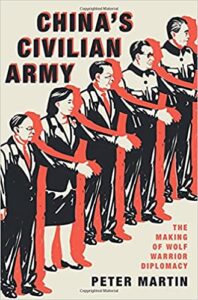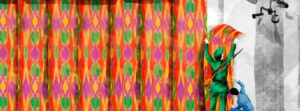 An aggressive new generation of diplomatic “wolf warriors” is set to advance Xi Jinping’s mission to mobilize developing countries to defend Beijing from Western criticism and advance China’s authoritarian influence in international rules, norms and organizations, according to Richard McGregor, a senior fellow at the Lowy Institute, and Neil Thomas, a China analyst at Eurasia Group in Washington DC.
An aggressive new generation of diplomatic “wolf warriors” is set to advance Xi Jinping’s mission to mobilize developing countries to defend Beijing from Western criticism and advance China’s authoritarian influence in international rules, norms and organizations, according to Richard McGregor, a senior fellow at the Lowy Institute, and Neil Thomas, a China analyst at Eurasia Group in Washington DC.
Indelibly associated with China’s historical weakness and capitulation, Chinese diplomats would sometimes receive calcium tablets in the mail, a way of telling them to grow a stronger spine to stand up to foreigners, they write for Nikkei Asia:
In response to such suspicions, Chinese diplomats behaved undiplomatically long before people branded them “wolf warriors,” says Bloomberg’s Peter Martin, and not just because they felt a need to overcompensate for perceptions of past weakness. In his 2021 book on the ministry, “China’s Civilian Army: The Making of Wolf Warrior Diplomacy,” Martin says it is also because “they are unable to extricate themselves from the constraints of a secretive, paranoid political system.”
“While their actions can sometimes seem aggressive, even bizarre, from the outside,” Martin wrote, “they make perfect sense when seen from a domestic perspective.”
The next wolf warriors: China readies new generation of tough diplomats https://t.co/ueINw2geIl
— Democracy Digest (@demdigest) July 6, 2022
The U.S. government is using the lessons it learned from sanctions against Russia to expand restrictions on exports to China and other countries in cases where companies or groups might threaten U.S. national security or violate human rights, current and former American officials say. President Biden and his aides call China the greatest long-term rival of the United States, surpassing Russia, The New York Times reports:
At Mr. Biden’s democracy summit in December 2021, the United States, Australia, Denmark and Norway announced they would begin building a new export control policy program to limit technologies going to authoritarian governments engaged in human rights abuses. ……The most prominent global export regime now, the Wassenaar Arrangement, is intended to control sales of technology that can be used for military as well as commercial purposes, but critics say it has drawbacks, including that Russia is a member.
Export controls “are at the red-hot center of how we best protect our democracies,” commerce secretary Gina Raimondo told a recent policy conference.
National Endowment for Democracy (NED) expert Kevin Sheives and his former colleague Jessica Ludwig tell the CSIS ChinaPower podcast that there’s no clear line between Beijing’s domestic propaganda and global media projections, and that China has emerged as a trendsetter in sharp power that can take advantage of younger democracies’ inability to recognize propaganda and disinformation.

National Endowment for Democracy (NED)
Recently, a palpable backlash against Chinese attempts to co-opt foreign politicians has gone beyond rhetorical accusations of “sharp power,” adds analyst Ching Kwan Lee. Legislations prohibiting interference in the political, economic and civil lives of democracies in the US, Australia and New Zealand have been enacted, she writes for China Quarterly:
Even African political elites, who have been widely assumed to be clients of Beijing after years of lavish gifts of aid and loans, have shown signs of collective defiance against China’s handling of Africans in China during the COVID-19 pandemic.
The CCP is systematically collecting information on members of the Xinjiang diaspora and creating databases that could strengthen the party’s overseas surveillance and interference work, analysts Lin Li & Dr James Leibold write in Cultivating friendly forces: The Chinese Communist Party’s influence operations in the Xinjiang Diaspora, a report for the Australian Strategic Policy Institute:
- community organisations in the Chinese diaspora and their elites are frequently used as conduits for promoting the party’s Xinjiang narrative and policies and are actively cultivated, and at times captured, by united front officials.
-

Credit: ASPI
some senior members of these organisations also hold prominent positions in China-based united front organs, which enables them to more effectively coordinate activities and promote the party’s agenda.
- the influence of CCP-linked community groups extends well beyond the Xinjiang diaspora, and some groups have secured the open or tacit endorsement of local politicians while influencing local public opinion.
- united front agencies leverage cultural events, language learning, business opportunities and political honours to entice and unify overseas Chinese behind the CCP’s hegemonic abstractions of ‘China’ and ‘Chineseness’ while marginalising, silencing and delegitimising CCP critics, and identities and cultures not approved by the party.
There are ways in which democrats can engage with the Chinese government without becoming a tool for its propaganda machine, says Human Rights Watch researcher Sophie McNeill:
- First, tone matters: Don’t pose for a smiling photo with a representative of a government that is committing crimes against humanity such as mass arbitrary detention, torture, and cultural persecution against Uyghurs and other Turkic Muslims in Xinjiang.
- Second, don’t let the Chinese embassy tell only one side of the story: Release a statement explaining the issues raised. …..
- Third, challenge the Chinese government on misleading claims….
- Finally, ensure consistency in responding to expressions of free speech….RTWT
How has Beijing employed sharp power and disinformation to pursue its political goals abroad? @JesLudwig and @KSheives of @ThinkDemocracy join the #ChinaPower Podcast to answer this question and more. Listen: https://t.co/rAgI6plxuO
— ChinaPower (@ChinaPowerCSIS) July 6, 2022







